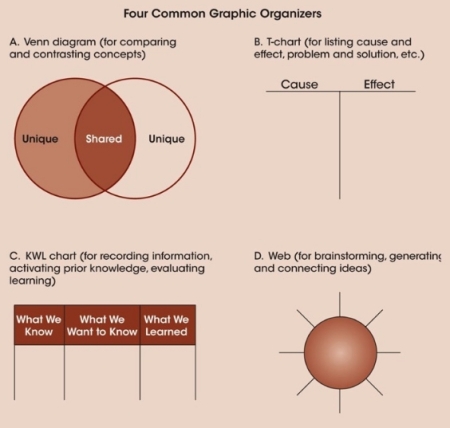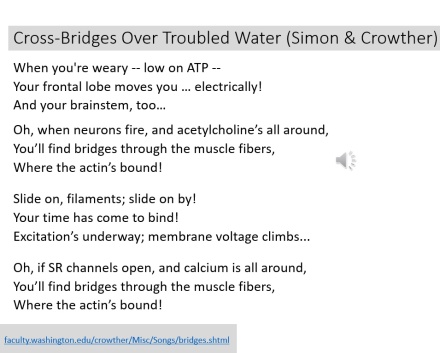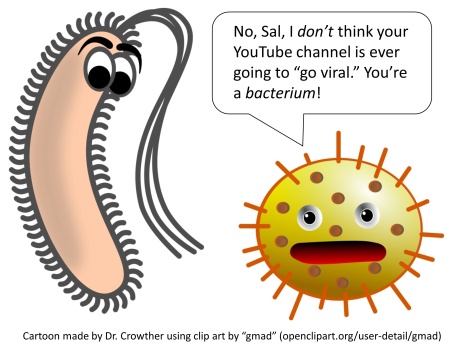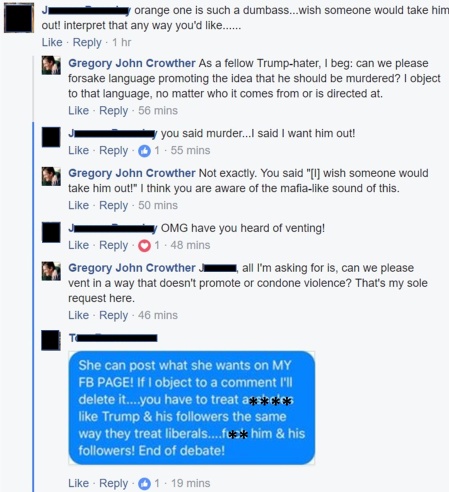Interest in my previous posts about the challenges of finding a stable college teaching job (post 1, post 2, post 3) has prompted me to write one more – about my experience returning to school to get certified to teach high school biology – in case this information is useful too. Below is an interview that I conducted with myself.
Wait a sec – I’m interviewing myself?
Yeah. Just go with it, OK?
Uh, OK. So I – er, you – already have a Ph.D. in biology. Why did you go back for a master’s degree?
As someone who is confined to the Seattle area for family reasons, and who had been on the job market for a few years, I was worried that I might never get a stable, full-time college teaching job. And while some people like the flexibility of teaching part-time, I decided that this wasn’t for me. Since high schoolers aren’t all that different from undergraduates, teaching high school biology became my backup plan.
One can teach at a private high school without a formal certification, but I decided to get certified for two reasons. First, I wanted to be eligible for both public-school and private-school jobs. Second, as someone with very little previous K-12 teaching experience, I needed something to convince prospective employers that high school was not a consolation prize for me, but a venue I embraced and was ready for. (As an illustration of the need for this, I was a finalist for a position at a private school in the spring of 2016, but I lost out to someone with high school experience.)
You enrolled at Western Governors University (WGU), an online school. Why?
I found their billboards really compelling! I’m mostly kidding. Like other online schools, WGU stresses its convenience, which had obvious appeal. I wanted to be able to start at any time and go at my own pace, rather than waiting for the start of the next annual cycle of application, admission, and enrollment. Moreover, I had previously applied for a job at WGU, and from the job interviews, I got the sense that the people there were dedicated, competent, and experienced.

[image taken from washington.wgu.edu]
What specific program did you enter?
I am a graduate student in the WGU Teachers College, pursuing a Master of Arts degree in Science Education.
Has the online program met your needs and expectations?
Yeah, mostly. In particular, the start-when-you-want and go-at-your-own-speed aspects have been very nice. Immediately after finishing my 2016 summer teaching at UW-Bothell, I started two online courses that WGU said I needed as prerequisites (geology and physics, neither of which I took as an undergrad). I finished those during the fall while continuing to teach part-time at UW-Bothell, then started the WGU program on December 1st as I transitioned into a self-imposed paternity leave from my college teaching. I sped through the regular courses over the winter and did my Pre-Clinical Experience (PCE, also known as Classroom Observation) at Glacier Peak High School (Snohomish, WA) in March. I will do my Demonstration Teaching (i.e., student teaching) this coming fall.
Did you take those prerequisites through WGU as well?
No, WGU didn’t offer these courses; it recommended various other options from which I chose. I took GEOL 103 (Life of the Past) through the Department of Independent Study at Brigham Young, and PHY250 (General Physics I) through StraighterLine.com.
Have you liked being an online student?
As I said earlier, the much-touted convenience was wonderful, as expected. I was even able to take tests at odd hours, like 8pm on a Saturday night. An additional perk – one that I had not anticipated – was that work was graded quickly and thoroughly. The multiple-choice tests were graded by computer, of course, but my essays were always returned within about two days and were always graded (by humans) according to a detailed rubric (provided in advance). I was impressed with the promptness and consistency.
Since I’m used to traditional courses where students interact with each other and the instructor very closely, it was weird (not always in a bad way) to complete the courses essentially by myself. WGU’s course mentors are happy to help you, but if you don’t need their help, they fade into the background. And while WGU tries to promote online interactions among its students, and some students take advantage of this, I didn’t.
Were the online courses rigorous?
They were OK. The online exam proctoring seemed thorough, and essays were checked for plagiarism with TurnItIn, so people do have to earn their degree – they can’t just cheat their way through. At the same time, the tests were all multiple-choice and often focused more on educational jargon than true in-depth understanding. Just as online schools will always struggle to create a community out of students who don’t occupy the same physical space, they will always struggle to foster the intellectual give-and-take that, in my view, is the hallmark of truly profound educational experiences.
I’m good at memorizing facts and taking multiple-choice tests, plus I have a richer science background than most students, so I was able to move through the curriculum quickly. But I did not do a lot of really deep thinking about educational issues. (For example, at no point was I required to examine primary research data underlying textbooks’ recommendations on how to teach effectively.) This was partly my own fault; the mentors were standing by, happy to discuss things with me, so I could have learned a lot more from them than I did.
At the same time, the curriculum is basically set up as: here is an educational challenge, and here is how we meet that challenge. For example, if a student has attention deficit hyperactive disorder (ADHD), the “solution” (I’m oversimplifying) is to set up an Individualized Education Plan (IEP) that ensures that the student has an extra-quiet environment for test-taking, et cetera. Which is all fine and good, but doesn’t necessarily lend itself to rich, probing discussions. (“So, what do you think would happen if this student DIDN’T have an IEP?”) I wish that more of the curriculum were framed a bit more theatrically, e.g., as a set of educational goals that are somewhat in competition with each other (depth versus breadth being a classic example), which might then spark discussions of how to prioritize these goals and which goals have more research support behind them and so forth.
My Student Mentor, whom I trust, says I’ll likely get my fill of challenging discussions during my upcoming Demonstration Teaching.
Do you think there’s a stigma attached to being a student of an online university?
In terms of public perceptions of legitimacy, I think online universities are currently about where online dating was 15 years ago.
The school where I had my Pre-Clinical Experience does not normally take students from online programs; I think an exception was made for me because a teacher and the principal went to bat for me. But doing my Demonstration Teaching there was out of the question, apparently.
As I thought ahead to finding a high school job, I was assuming-slash-hoping that my credentials as a professional biologist would help me land a good position, irrespective of people’s perceptions of WGU or online schools in general.
You just received and accepted a tenure-track job offer at a community college. Congratulations!
Thanks, self! I couldn’t have done it without you.
Given this development, do you now regret going through the high school teaching preparation program?
No, I don’t. First, as I’ve written before, executing this alternative plan allowed me to avoid an air of desperation as I continued applying for college jobs. Second, I am learning and am being reminded of teaching strategies that will come in handy in the future, regardless of the seniority of my students. (Maybe that should be another post?) Third, going through K-12 teacher training will help me in K-12 outreach efforts if I stay involved in those. Fourth, this training is also relevant to my ongoing educational research (e.g., on the educational value of content-rich music).
Don’t write a whole separate post about what you’re learning about teaching, just give us a few quick highlights.
All right. My student teaching in the fall will be a rare opportunity to receive regular, detailed feedback from a veteran teacher, which will be quite valuable in and of itself. But back in the book-learnin’ part of the curriculum, for example, there was a section about graphic organizers that I found really helpful. In brief, when writing out notes with students, we shouldn’t necessarily write them as a series of bullet points, but could instead arrange them into a Venn diagram, T-chart, KWL chart, or concept map so as to show the bullets’ relationships with each other. Also, there was a fair bit of talk about the “5E” model of instruction, i.e., Engage, Explore, Explain, Elaborate (or Extend), and Evaluate. This reminded me that I often skimp on the Engage phase. I can and should do a better job of kicking off new units with compelling questions or interesting observations that get students excited to learn more.

[image from P.R. Burden & D.M. Byrd (2013), Methods for effective teaching: meeting the needs of all students]
During my PCE I was able to observe some highly successful teachers, one of whom gives her students some really neat ways of graphically organizing information. Her students are always making little lift-the-flap booklets and things from which they can study. Once you get past the superficial resemblance to 2nd-grade art projects, this approach is very useful and fun! In addition, this teacher always has multiple projects going in parallel so that if a student finishes one assignment, he/she always has something else to do. I tend to arrange assignments in series rather than in parallel, but her approach is better, and I hope to emulate it.
My PCE also gave me the chance to observe classroom management issues, which are relevant to college too. If a student comes to my class and spends the whole period on his phone, I used to think, “Well, that’s his choice.” But now I see more clearly that such behavior can be contagious, and that more policing may be needed to prevent entire sections of the room from becoming disengaged.
Any final comments on the online student experience?
If you do a class project on empirically testing the best way to make cocoa, you should think twice about actually tasting the experimental samples, because that might violate a school policy forbidding unauthorized experimentation on vertebrate animals.
Seriously?
Seriously.







